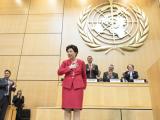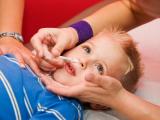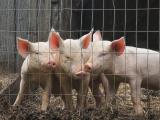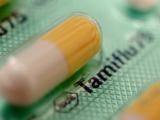Feb 27, 2013 (CIDRAP News) – Scientists have found the first evidence of a link between the 2009 pandemic flu vaccine Pandemrix and an increased risk of narcolepsy in English children, echoing previous findings in several other European countries.
A study by a team from the United Kingdom's Health Protection Agency (HPA) and two hospitals suggests that the risk of narcolepsy in children aged 4 to 18 after receiving Pandemrix was about 1 in 55,000 doses, according to the HPA and the researchers' report in BMJ, formerly the British Medical Journal.
Pandemrix, a monovalent vaccine for the 2009 H1N1 virus, is made by GlaxoSmithKline and contains the adjuvant AS03. Previous studies linked use of the vaccine to a higher risk of narcolepsy in children in Finland, Sweden, and Ireland, and to children and adults in France.
In the UK, the vaccine was recommended for use in children at risk for flu complications during the 2009 pandemic and was used occasionally in children during the 2010-11 flu season, the HPA said in a statement today. Its use in those under age 20 has been restricted in Europe since July 2011.
In the BMJ study, the researchers compared the rate of Pandemrix vaccination in children who had narcolepsy with the rate in the general age-matched English population, after adjusting for clinical conditions that were indications for vaccination.
They reviewed the records of 75 children who were diagnosed as having narcolepsy after January 2008 and were treated at a number of sleep centers in England. Eleven of them had been vaccinated before the onset of narcolepsy, and seven of these had been vaccinated within 6 months of onset.
The authors calculated that, in comparison with the general population, the narcolepsy case-patients were more than 14 times as likely to have received Pandemrix (odds ratio, 14.4; 95% confidence interval, 4.3 to 48.5). The odds were even greater for those who were vaccinated less than 6 months before the onset of narcolepsy.
The authors said their findings translate into a risk of between 1 in 57,500 and 1 in 52,000 doses of the vaccine.
In the HPA statement, lead author Elizabeth Miller, MB BS, a consultant epidemiologist with the HPA, said, "These findings suggest there is an increased risk in children of narcolepsy after Pandemrix vaccination, and this is consistent with findings from studies in other European countries. However, this risk may be overestimated by more rapid referral of vaccinated cases. Long term follow up of people exposed to Pandemrix is needed before we can fully establish the extent of the association.
"Our findings have implications for the future licensing and use of adjuvanted pandemic vaccines," she added. "Further studies to assess the possible risk associated with other vaccines used in the pandemic, including those with and without adjuvants, are also needed to inform the use of such vaccines in the event of a future pandemic."
Co-author John Shneerson, MD, a consultant physician from the Respiratory Support and Sleep Centre at Papworth Hospital in Cambridge, said in the HPA statement that narcolepsy is thought to stem from dysfunction in a small group of cells in one of the sleep centers in the brain, as a result of an abnormal reaction of the immune system.
"Pandemrix may have triggered an immune reaction against the sleep centre cells in those children who were genetically predisposed to develop narcolepsy," he said. "This study has been important in helping to shed light on the mechanism of how narcolepsy can develop."
The HPA estimated that 20,000 people in the UK have narcolepsy and noted that drug treatment and lifestyle measures are usually effective in relieving the symptoms.
Miller E, Andrews N, Stellitano L, et al. Risk of narcolepsy in children and young people receiving AS03 adjuvanted pandemic A/H1N1 2009 influenza vaccine: retrospective analysis. BMJ 2013 (published online Feb 26) [Full text]
See also:
Feb 27 UK HPA statement
Feb 26 BMJ press release
2009 H1N1 vaccine safety page from the European Centre for Disease Prevention and Control, with timeline (updated Feb 27)
Jan 30 CIDRAP News story "Study finds post-H1N1-vaccination rise in narcolepsy in 3 nations"
Sep 21, 2012, CIDRAP News story "French study finds narcolepsy link to H1N1 vaccine in adults"
Sep 20, 2012, CIDRAP News story "ECDC studies shed new light on narcolepsy and H1N1 vaccine"
Apr 19, 2012, CIDRAP News item "Ireland reports Pandemrix links to narcolepsy in kids, teens"

















